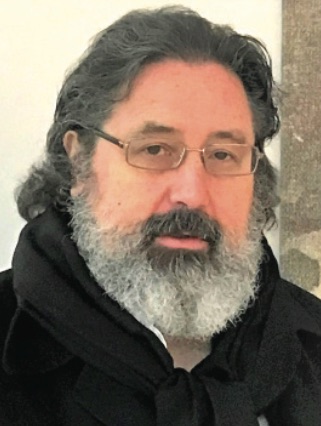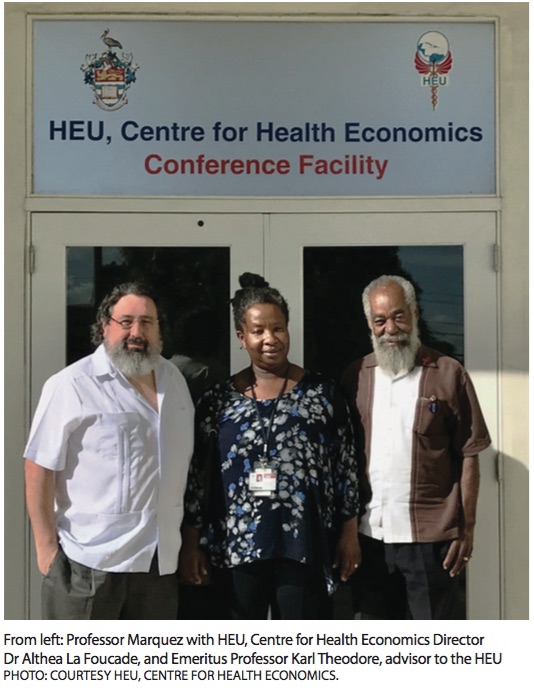Professor Patricio V Marquez, internationally renowned Public Health specialist, receives title of Honorary Professor from The UWI and three-year attachment to HEU, Centre for Health Economics
“Public health policy goes way beyond the biological aspects of health. Instead, it focuses on how biology interacts with social, economic, and environmental drivers to determine who has good health in a society and who doesn't. To echo the words of the eminent Stanford University health economist Victor Fuchs, it is the study of all of those things that determines ‘who shall live’.”

These are the words of Professor Patricio V Marquez, former Lead Public Health Specialist for the World Bank Group, and recent recipient of the title of Honorary Professor from The University of the West Indies.
Aside from his 32 years of service at the World Bank, Professor Marquez's has also served as Consultant to the World Bank post-retirement for the preparation/implementation of the US$26 billion Global COVID-19 Emergency Response Programme over 2020-2022 that covered more than 110 countries. He is the co-author of the “Better Together: A Mental Health Strategy for the World Bank Group”, which was launched on May 4, 2022, to cover staff and families.
Prof Marquez is also a Senior Associate at the John Hopkins Bloomberg School of Public Health; a member of the International Advisory Committee for the Global Mental Health Programme at the University of Washington; a governing member of the Charles Darwin Foundation for the Conservation of the Galapagos Islands; a Pledge Champion at the Tobacco Free Portfolios Foundation; and recently, a member of the International Advisory Committee for the preparation of the World Non-Communicable Diseases (NCD) 2023 Conference that was held in Toronto, Canada on June 25-30, 2023.
He also boasts of a long and fruitful relationship with The UWI, where he is especially known for his work with the HEU, Centre for Health Economics at the St Augustine Campus, and for his contributions towards the fight against HIV and AIDS in the region. More recently, he has been recognised as a proponent of raising taxes on tobacco to increase prices, reduce use, and prevent premature death and ill health.
One of the things that he intends to accomplish during his three year attachment to the HEU is to embark on a process of inter-generational transfer of knowledge and experience by working with younger individuals involved in the development of health agendas for their countries and communities.
“At this new stage of my life,” he says, “I would like to use some of my accumulated knowledge, including the tacit knowledge acquired over years of services in different countries, to help open up some new frontiers for the next generation. Throughout my career, I have worked in over 80 countries, and now that I am at a different stage in my life, I believe that it is my responsibility to contribute to the generation that will substitute ours.”
Originally from Cuenca, Ecuador, Professor Marquez's work within the region can be traced back to a CARICOM initiative at the turn of the century to tackle the growing AIDS epidemic, when the Caribbean was the second-most affected region in the world in terms of HIV prevalence rates after Sub-Saharan Africa. Working alongside such eminent faculty of the UWI as Professor Courtney Bartholomew and Professor Karl Theodore, he co-authored a report on HIV and AIDS in the Caribbean.
On behalf of the World Bank, he was later asked to put together a regional support programme, valued at US$150 million, which was allocated to support different Caribbean countries in putting together and launching national HIV and AIDS programmes.
“It was clear at the time that, if this issue was not addressed head on, it stood to cause major damage to the population and economies of Caribbean countries,” says Professor Marquez.
He notes that one of the major successes of the initiative was realised in 2001 when Barbados became the first country in the world to receive support from the World Bank to introduce antiretroviral drug treatment to prevent the progression of HIV to AIDS—at the time when treatment was not considered as cost-effective, anticipating what is now common medical orthodoxy that “treatment is prevention”. This support was later expanded to other Caribbean countries, including Trinidad and Tobago.

Professor Marquez believes that this successful initiative is indicative of two of the region's strengths regarding health policy: our ability to work together as a region, and the expertise that can be found within the islands.
He adds, “We also need to recognise those institutions which have regional natures such as The UWI and the Caribbean Public Health Agency (CARPHA) that play a critical role in institutional efforts regarding health policy in different countries.”
Professor Marquez specifies that he would like to do his part to combat the biggest health issue currently facing the Caribbean:
“The big elephant in the room facing all Caribbean countries is how to effectively deal with non-communicable diseases, and particularly obesity, which contributes to a whole host of medical conditions. With the proper measures, we know that this is something that we can handle.
“At one stage, people used to say that smoking would never stop because everybody smokes. We know now that absolutely nobody needs to smoke to be happy. The same can be said of processed foods; people do not need to eat these heavily processed foods, full of salt and sugar and trans-fats, in order to be happy and healthy.
“And, this is not just a health problem, it's an economic one, because if you are not preventing problems then you have to treat them, and some of these problems are very expensive to treat. So, this fight against these preventable non-communicable diseases in the region is one thing that I would like to help contribute towards leveraging action from different sectors – from fiscal and regulatory policies to healthcare.”
For Professor Marquez, this new phase of his life marks yet another point on a journey that started back in his hometown of Cuenca where he was deeply influenced by the work of his father.
“I must say that all of the work that I do can be traced back to the example of my father, who was a pathologist and also a very good clinician. As a pathologist, he had to conduct autopsies to determine the cause of death and it was then that he realised that most, if not all, of those who were dying from preventable diseases, such as tuberculosis, were the poor.
“I vividly remember him asking, ‘why is it that the poor are dying of these diseases that can be prevented?’ This has remained with me all my life, and it is the reason that I find myself much more interested in the social and economic drivers of health. It is why I have spent the majority of my life working as a Public Health specialist, and why I continue to work with institutions such as The UWI to help devise measures to improve the well-being of populations.”